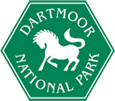Ponies and Dartmoor
Ponies have roamed free on Dartmoor for at least four millennia.
Ancestors of the ponies you see today left hoof prints which fossilized at the bottom of a Bronze Age ditch, they are mentioned in the will of Devon's 10th Century Bishop and listed in the Exon Domesday Book (the Domesday Survey of South West England).
Today, semi-wild ponies are still central to the Traditions and Culture of Dartmoor's farmers, known as Commoners (Farming | Dartmoor), they roam freely around the commons and like all livestock, are owned by farmers.
Ponies have an important grazing job and play a vital role in maintaining a variety of habitats and supporting wildlife.
Most of the ponies you see as you travel across Dartmoor are Semi-Wild Dartmoor Hill Ponies. Dartmoor is also proud of its breed, the Dartmoor Pony. The importance of the pony is evidenced by the fact that when Dartmoor was designated a National Park in 1951, the pony was chosen to be its logo.
You can find out more about Dartmoor's pony population and breed, here:
Dartmoor Hill Ponies | Dartmoor Pony |
Help look after Dartmoor’s ponies
![]()
Please do not feed or touch the ponies.
- It encourages them to stay near the road where they might be killed or seriously injured.
- The food we enjoy is not a natural or healthy diet for ponies and can make them very ill. This includes carrots and apples, which can upset their digestive system and even cause them to choke.
- Ponies will learn to expect food from people and might frighten or hurt them in an attempt to get more food.
- The ponies are untamed - they can be unpredictable and may kick and bite if approached.
- It is illegal to feed the ponies (See Byelaws: In respect of Dartmoor National Park 10(1)).
Keep dogs under control in the vicinity of ponies and livestock in general.
Take all your litter home - a plastic bag or even a single ring-pull from a can will cause terrible suffering if swallowed.
Keep to the 40 mile per hour speed limit - this is the maximum speed limit on many of Dartmoor’s roads. Always drive cautiously according to road conditions and visibility.
Park only in designated car parks - pulling in on the roadside causes damage to moorland verges and is potentially dangerous to other roads users. It also attracts ponies to the road looking for food.
Garden waste, including grass cuttings are dangerous to ponies. Disposing of garden waste (fly tipping) on Dartmoor is illegal, and can be fatal to livestock when ingested.
Report an injured animal
If you see an injured pony, please contact the Dartmoor Livestock Protection Officer:
Livestock Protection officer: 07873 587561
If you are involved in a vehicular accident with a pony you must telephone the police. If you witness such an accident please also telephone the police.
Follow the Ranger Code
You can help to protect the wildlife and animals on Dartmoor by following the Ranger Code
Follow the Ranger Code